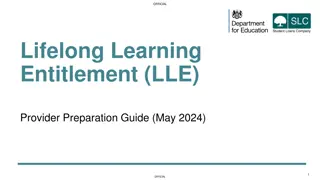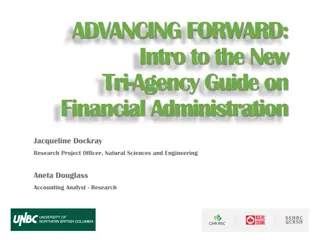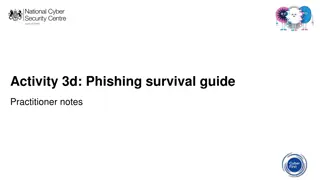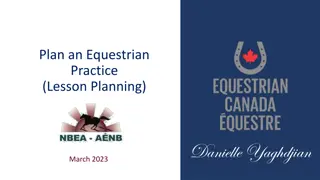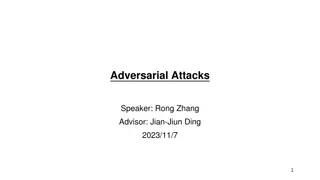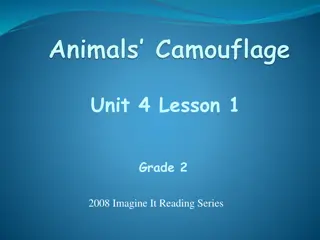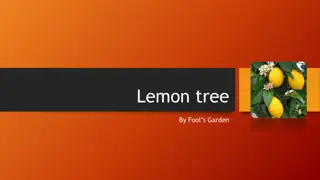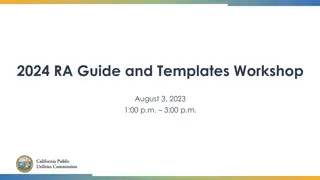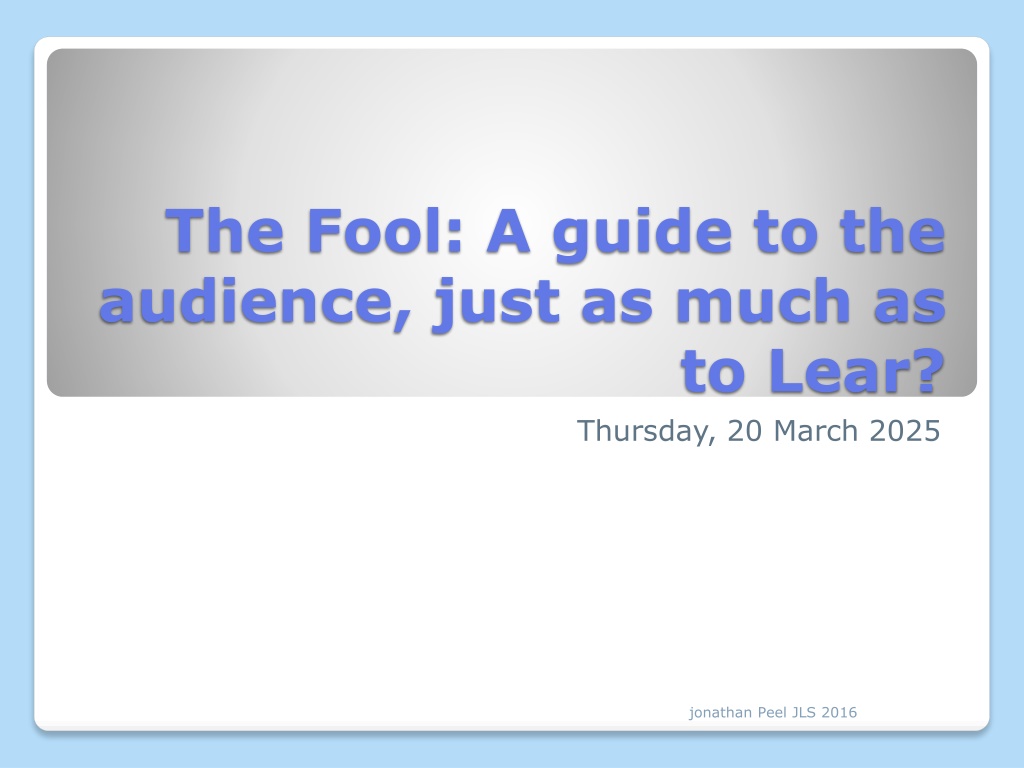
Exploring the Character of the Fool in King Lear
Delve into the enigmatic character of the Fool in Shakespeare's King Lear, analyzing his actions, cryptic judgments, and poignant presence that guide both the audience and the King. Consider the impact of the Fool's absence and how it shapes the complexity of the play.
Download Presentation

Please find below an Image/Link to download the presentation.
The content on the website is provided AS IS for your information and personal use only. It may not be sold, licensed, or shared on other websites without obtaining consent from the author. If you encounter any issues during the download, it is possible that the publisher has removed the file from their server.
You are allowed to download the files provided on this website for personal or commercial use, subject to the condition that they are used lawfully. All files are the property of their respective owners.
The content on the website is provided AS IS for your information and personal use only. It may not be sold, licensed, or shared on other websites without obtaining consent from the author.
E N D
Presentation Transcript
The Fool: A guide to the audience, just as much as to Lear? Thursday, 20 March 2025 jonathan Peel JLS 2016
Candidates are invited to consider the character and presentation of the Fool, in the light of the prompt that 'the Fool guides the audience just as much as he guides the King' (AO3). Candidates should explore with relevant detail (AO2) the Fool s actions and characterisation in the play: his continued outspokenness from the love-test onwards, his outspokenness in Lear's daughters' houses, and his behaviour on the heath. Good answers will look at the Fool s cryptic judgements and songs, and will consider the ways in which the Fool s presence adds poignancy to Lear s situation. Good answers may consider the effect of the Fool s absence in the latter part of the play, and reflect on how the play would have been less complex and very different had the role not been created. Candidates may be alert to critical views of the play (AO3), and may refer to recent productions. What do you notice here? Focus, according to OCR: jonathan Peel JLS 2016
In section A, the dominant assessment objectives are AO3 (**), to offer responses informed by interpretations of other readers, and AO2 (**), to demonstrate detailed critical understanding in analysing the ways in which structure, form and language shape meanings in literary texts. Answers are also assessed for AO1 (*), to articulate creative, informed and relevant responses to literary texts, using appropriate terminology and concepts, and coherent, accurate written expression and AO4 (*), to demonstrate understanding of the significance and influence of the contexts in which literary texts are written and understood. This guidance is intended to indicate aspects of questions that may feature in candidates answers. It is not prescriptive, nor is it exclusive; examiners must be careful to reward original but well- focused answers and implicit as well as explicit responses to questions. Assessment: jonathan Peel JLS 2016
Audience? 3 specific audiences to consider King James The 17th Century audience The modern audience, especially since the 1960s. The question: jonathan Peel JLS 2016
If we accept that there was a fear that James might be going to divide his Kingdom between his sons Albany and Cornwall we need to consider the Fool in this light. In Act 1 and 2 find all riddles/speeches designed to show the folly of dividing the Kingdom, especially those which make the King an object of ridicule. Could James miss this didactic approach, even when given in the process of creating comedy? King James: jonathan Peel JLS 2016
Look at the prophecy: Act 3.2 General terms seem to cover all of society here. Priests, brewers, tailors, nobles, heretics, squire, knight Message is for all people and all times. NB, not in the Quarto, this shows how the Folio has increased the importance of the Fool as a commentator on events and ideas of the day. Prophecy seems to point at a very believable coming Doom for the realm, beset as it was by plague, insurrection and sectarian discord. Then shall the realm of Albion/Come to great confusion. Lear has left the stage at this point so Fool is foregrounded and is relating solely to the audience. 17th Century Audience jonathan Peel JLS 2016
Less influenced by the Apocalyptic ideas of the prophecy Can still be influenced in their thinking by the character More likely to be troubled by his absence as the play continues Post war productions need to account for his absence in some way- interpolated hangings and so on. Productions are more likely to play with character to gain sympathy - age can vary to extremes, has been played by both male and female actors. Modern readings jonathan Peel JLS 2016
Last point made re audience can be linked to the Cordelia/Fool doubling idea. Plenty of arguments against, often based on Robert Armin as fool NB uncertain who might have played Edgar My poor fool is hanged suggests a link between the characters. Read critical comment and remember that there is no need to settle on a single answer here. Guides the king jonathan Peel JLS 2016
Kent takes his role in 1.1 (some productions have Fool on stage in 1.1, but then we need to wonder why he is silent) and ends up banished. Lear calls for his fool in 1.4 when he has started his journeys. He needs guidance and recognises the absence of his fool who has much pined away since Cordelia s banishment. Though not explored on stage this establishes a clear link between Fool and Cordelia as a figure of the light who stand against Lear s current foolishness. Guide in Act 1 jonathan Peel JLS 2016
Ignores Lear and speaks only to Kent Point is well made only a fool would take the side of one who is acting so stupidly Moves swiftly between Kent and Lear all the jokes and visual fooling focuses on the actions of Lear in terms of Division of the Kingdom- this is his great foolishness. Little reference to Cordelia focus is clear (NB guidance to audience of the day: KJ1) Advice is pointed and bitter: FOLIO gives Fool the response: Lear s Shadow and suggests a much more direct sense of instruction than the Quarto. Note Fool s behaviour in the scene jonathan Peel JLS 2016
Outspoken and humorous for Lear. Guidance here is for Lear, but also for Goneril? See if you can find a sense of the advice having two sides? BUT: why does Fool so antagonise Goneril is there a sense in which he might wish for the banishment as a necessary step in curing Lear? let go thy hold when a great wheel runs down a hill 2.2.261 ff Suggests an awareness of the impossibility of fighting the inevitable descent. Fool with daughters: jonathan Peel JLS 2016
Becomes first focus of Lears new-found kindness go in boy Terrified of Tom childlike fragility Stops advising and riddling plays very reduced role in the scene in the hovel, which only exists in the Quarto Folio Fool is never equated with Edgar as happens here in the Quarto (3.6 17-65) Put to one side by Lear and ignored by Shakespeare at the end of 3.6 His teaching cannot continue in the face of unaccommodated man and Shakespeare adds his lines in 3.6 in the Folio I ll go to bed at noon suggests a capping of Lear s nonsense line and a fitting conclusion for the role enigmatic and inconclusive. 3.4 and 3.6 jonathan Peel JLS 2016
Shakespeare does not need the character written as a half role. Role taken by Edgar (Comedy), by Lear (Riddling and nonsense) and by Gloucester (Questioning) Has been a foil to Lear, compelling him to look at own conscience Has been a guide for the audience in all senses, forcing contemplation of the outcomes of Lear s actions Can only take Lear so far has to be replaced by those not as close to the King. Folio suggests a sharper tongue in Act 2&3 and allows the role to fade away without simply vanishing. How would he be written in Act 4&5? jonathan Peel JLS 2016

![[PDF READ ONLINE] LAS VEGAS TRAVEL GUIDE 2023: DISCOVERING THE EXCITEMENT AND BE](/thumb/2060/pdf-read-online-las-vegas-travel-guide-2023-discovering-the-excitement-and-be.jpg)
![textbook$ What Your Heart Needs for the Hard Days 52 Encouraging Truths to Hold On To [R.A.R]](/thumb/9838/textbook-what-your-heart-needs-for-the-hard-days-52-encouraging-truths-to-hold-on-to-r-a-r.jpg)
![❤Book⚡[PDF]✔ Fool Me Once: Should I Take Back My Cheating Husband?](/thumb/20473/book-pdf-fool-me-once-should-i-take-back-my-cheating-husband.jpg)

